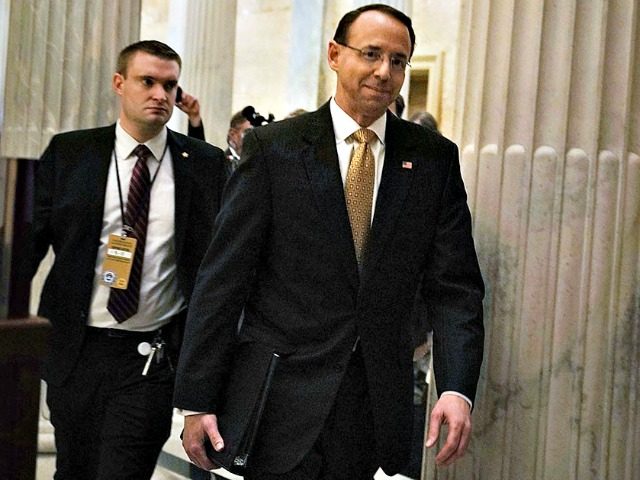After President Donald Trump vented his frustration over the Justice Department’s failure to meet the House Judiciary Committee’s deadline to produce documents from the FBI investigation of Hillary Clinton’s email server, DOJ leadership unveiled Monday the latest attempt to appease their critics.
According to DOJ Spokeswoman Sarah Isgur Flores, Attorney General Jeff Sessions and FBI Director Christopher Wray agreed to assign Trump-appointed U.S. Attorney John Lausch from the Northern District of Illinois to oversee the extensive operation to produce the documents to satisfy a subpoena from Judiciary Committee Chairman Bob Goodlatte (R-VA).
“The Attorney General and FBI Director understand the concerns of members of Congress and the President about the pace of production and level of redactions in the documents already received by the Committee,” Flores said in a statement Monday, continuing:
Mr. Lausch, who has experience in the Department and in private practice, will ensure that production moves at an acceptable pace and that any redactions are necessary and consistent under the relevant laws and regulations. He will have independent authority to oversee this production and report progress to the Attorney General. Mr. Lausch will also be available to meet with members of Congress to discuss the redaction process to ensure that they remain confident in the Department’s efforts to be as transparent as possible with the Committee.
The ongoing credibility of the Department with the American public is vital to its law enforcement and national security mission. By appointing Mr. Lausch to oversee this specific document production, our goal is to assure Congress, the President, and the American people that the FBI is going to produce the relevant documents and will do so completely and with integrity and professionalism.
Assistant Attorney General Steven Boyd already announced a doubling of FBI staff devoted to producing the documents to last month. That measure evidently did not satisfy the president who, on Saturday, came in forcefully on the side of the Goodlatte and other congressional Republicans like Senate Judiciary Committee Chairman Chuck Grassley (R-IA), House Oversight Committee Chairman Trey Gowdy (R-SC), and Freedom Caucus Chairman Mark Meadows (R-NC):
What does the Department of Justice and FBI have to hide? Why aren’t they giving the strongly requested documents (unredacted) to the HOUSE JUDICIARY COMMITTEE? Stalling, but for what reason? Not looking good!
— Donald J. Trump (@realDonaldTrump) April 7, 2018
Lawmakers of the House Judiciary Committee are angrily accusing the Department of Justice of missing the Thursday Deadline for turning over UNREDACTED Documents relating to FISA abuse, FBI, Comey, Lynch, McCabe, Clinton Emails and much more. Slow walking – what is going on? BAD!
— Donald J. Trump (@realDonaldTrump) April 7, 2018
Due to Attorney General Jeff Sessions’ recusal from matters concerning the 2016 presidential election, Rosenstein oversees many of the matters referred to in the House Judiciary Committee subpoena.
If the president was ambiguous as towards whom his anger was directed, that may have been cleared up later by Rep. Mark Meadows (R-NC). Meadows unloaded on Rosenstein on Fox News’s Justice with Jeanine Pirro, threatening the Deputy Attorney General with possible contempt of Congress charges or even impeachment. “If the deputy attorney general is not willing to do it and not willing to allow us to have our constitutional oversight authority supported, then we’ll find someone who can,” he told Pirro. ““The first area is contempt of Congress. … One of the things we have in our toolbox is impeachment.”
“Rod Rosenstein can call Michael Horowitz, who has the documents, and say, ‘just give them to Congress,'” Meadows went on.
As the head of the executive branch, President Trump also has that power to compel production.
Evidently, the appointment of Lausch and the doubling of the guard at the production team was not enough to satisfy some critics.
“I am trying, without much success, to understand the recent announcement by the Department of Justice with respect to the months old request for documents by Congress,” Gowdy said in a statement responding to the move.
Gowdy continued:
I am confident U.S. Attorney John Lausch is a person of competence and character, however, I struggle to understand what has been happening over the previous months since Congress was assured DOJ and FBI were working on the document request. I also struggle to understand U.S. Attorney Lausch’s specific role.
Congress requested these documents months ago. Congress has consistently been assured the production was in progress. How is injecting someone new into an ongoing review and production process calculated to expedite the process?
For her part, the DOJ’s Flores insisted the review was proceeding to produce the documents. “Currently, 54 FBI staff are working each day in two shifts from 8am to midnight. Today, the FBI will be producing 3,600 pages of additional material requested by the House Judiciary Committee,” she said. “The IG’s initial request for information resulted in production to the Inspector General of over a million pages of material, the majority of which was not relevant to the FBI’s investigation.”
The material must be sorted not only for relevance, but to exclude classified and privileged information like attorney-client communication and so-called “work product” made by lawyers in preparation for trial. As Flores explained:
These documents include grand jury material, the disclosure of which is prohibited by Federal Rule of Criminal Procedure 6(e), classified information, and information about unrelated and ongoing investigations that must be redacted in order to preserve the integrity of other investigations and to avoid the appearance of political influence in criminal prosecutions.
Flores, however, gave no firm date for completion, despite missing last Thursday’s deadline.

COMMENTS
Please let us know if you're having issues with commenting.